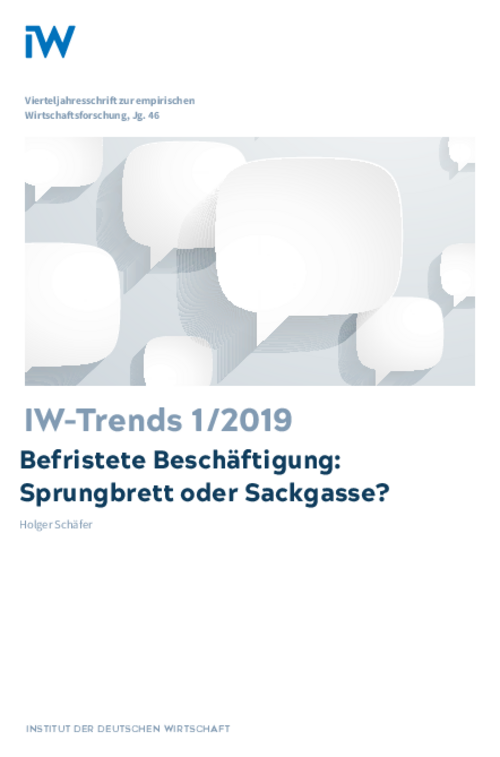The Federal Government is seeking to impose restrictions on the existing statutory vehicles for limiting the term of employment contracts. The justification often offered for this move is that the employees concerned perceive the uncertainty inherent in fixed-term contracts as negative.

Fixed-Term Employment: Springboard or Dead End?
IW-Trends

The Federal Government is seeking to impose restrictions on the existing statutory vehicles for limiting the term of employment contracts. The justification often offered for this move is that the employees concerned perceive the uncertainty inherent in fixed-term contracts as negative.
It is assumed that offering the same positions on a permanent basis is the superior alternative. However, since firms’ demand for labour differentiates between flexible and inflexible employment, there is a clear risk that, in the absence of the term-fixing option, either other instruments will be used to achieve the same flexibility or demand for labour will decrease. The sociodemographic group most affected by fixed-term contracts is that of younger workers at the start of their careers. As can be demonstrated by analyses of the Socio-Economic Panel (SOEP), if the use of fixed-term contracts is rendered more difficult, this group may lose any chance of entering the labour market at all. Nor is there any evidence that entering into fixed-term employment precludes a subsequent transition to permanent employment and thus entails the risk of entrapment in permanently precarious circumstances. Within a period of three years, more than half of fixed-term employees switch to permanent employment. An analysis based on propensity score matching shows that, for the previously inactive, taking up fixed-term employment increases the likelihood of immediate success on the labour market. After three years, those entering fixed-term employment have spent over seven months longer in full-time work and seven months less in unemployment. In addition, they have achieved a cumulated salary that is €32,000 higher than that of a control group of similar persons who have not taken this step.

Holger Schäfer: Befristete Beschäftigung: Sprungbrett oder Sackgasse?
IW-Trends

More on the topic

Determinants of personnel planning in Germany
The German labor market has been growing since 2005. The dip in the wake of the coronavirus pandemic between 2020 and 2022 is an exception, as the German labor market has reached a record level of 45.9 million people in employment by 2023.
IW
What factors influence the career ambitions of people with disabilities?
Many companies in Germany report having difficulties not only in recruiting employees, but also in filling vacant management positions.
IW